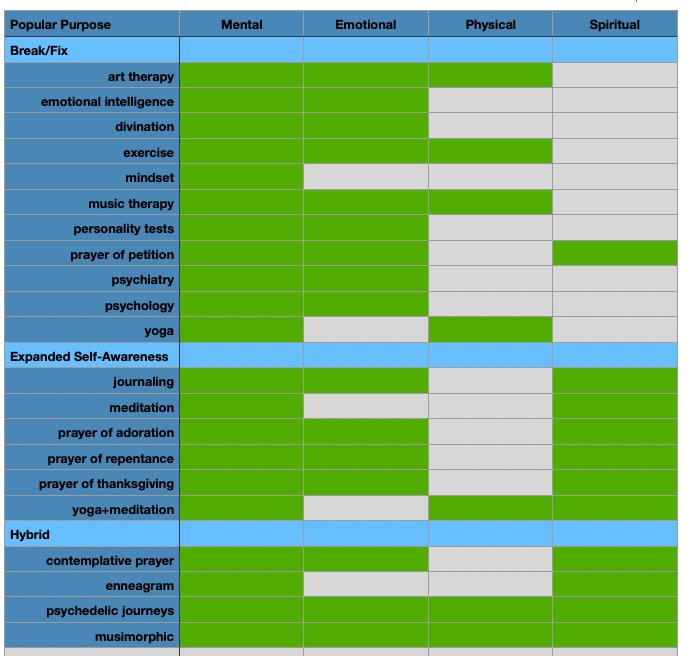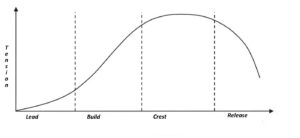This is a non-exhaustive list of how Musimorphic works for you: no pretty pictures, just the facts. We chose these examples to illustrate the vast opportunity for Musimorphic outside of clinical practice. They apply equally well to individuals, families, teams, and entire organizations.
For completeness, we have also provided links for “music caregiving” (sometimes branded as “palliative music” or “life music care”) and clinical “music therapy.”
For proof of Musimorphic, there are thousands of years of anecdotal evidence to review, at least one hundred years of modern clinical research to support you, and, best of all, your own self-evident results. We describe this in more detail as is relates to the Musimorphic Quest on this page.
Beyond supportive/background music, these examples invite intention, purpose, and skillful use…no therapist is needed. Want to know more? Ask us how!
Who is Musimorphic For?
A remarkable benefit of Musimorphic is that it works for people of any:
- culture
- ethnicity
- intelligence (IQ or EQ)
- personality type (Meyers-Briggs, DISC, CliftonStrengths, etc)
- level of formal education
- socio-economic status
- primary spoken language
- professional or work experience
- management style
- level of responsibility
- age
- gender
- neurodiversity
- belief system
And Musimorphic is:
- App-free (no need for more damaging screen time)
- Drug-free (no prescription needed)
- Easy to learn
- Fun to practice
Skills You Learn or Strengthen
- Listening
- Empathy
- Compassion
- Acceptance
- Self-awareness
- Intuition
- Joy
- Authenticity
- Vulnerability
- How to offer psychological safety
- Intervention (Pain Points)
The List
Personal Development Skills
- Embrace and celebrate diversity
- Advocate for equity and fairness
- Foster a culture of inclusion
- Resolve conflicts constructively
- Offer peer counseling support
- Provide mentoring opportunities
- Motivate and inspire others
- Promote active engagement
- Foster group/team cohesion
- Clarify and support group/team purpose
- Support training and skill development
- Improve communication across language barriers
- Facilitate alignment and understanding within groups
- Offer relief from physical pain
- Provide anxiety relief techniques
- Assist with grief processing
- Help individuals overcome fears
- Guide anger management and release
- Support healing from trauma
- Encourage joy and positive emotions through dopamine regulation
- Ignite excitement and enthusiasm
- Foster a sense of anticipation and curiosity
- Cultivate a desire for learning and exploration
- Promote relaxation and stress reduction
- Teach techniques to improve breathing
- Support better sleep habits
- Enhance focus and concentration abilities
- Encourage inner peace and harmony
- Promote overall health and wellness
- Assist with tension-type headache relief
- Embrace and find comfort in uncertainty
- Encourage openness and adaptability
Leadership and Soft Skills
- Foster empathy and understanding
- Cultivate compassion and care
- Emphasize authenticity and genuineness
- Appreciate and value others’ contributions
- Exercise discretion and confidentiality
- Build resilience and emotional strength
- Uphold integrity and ethical behavior
- Foster discernment and sound judgment
- Encourage collaborative teamwork
- Respect and uphold dignity for all individuals
- Promote humility and modesty in interactions
- Develop charismatic leadership qualities
- Cultivate a culture of forgiveness and healing
- Foster respect and mutual admiration
- Nurture loyalty and commitment
- Encourage courage and risk-taking
- Uphold strong ethical principles
- Encourage thoughtful deliberation
- Promote kindness and compassion in interactions
- Cultivate humility and a willingness to learn
- Foster deep insights and self-awareness
- Embrace abundance and positivity
- Promote altruism and giving back
- Encourage fairness and equal treatment
- Cultivate patience and understanding
- Ensure consistency and reliability
- Uphold honor and ethical behavior
- Encourage humor and light-heartedness
- Strive for excellence and continuous improvement
- Promote cooperation and teamwork
- Advocate for sustainability and responsible practices
- Appreciate humor and lightness in challenging situations
- Support the development of self-awareness
- Cultivate self-compassion and self-care
- Encourage noble and honorable actions
Growth and Improved Performance Skills
- Support safe exploration of self-awareness
- Encourage self-actualization and personal growth
- Facilitate safe risk-taking and learning
- Develop emotional regulation skills
- Inspire and foster creativity and innovation
- Enhance memory and retention abilities
- Support physical performance improvement
- Develop emotional awareness and intelligence
- Encourage better understanding of interpersonal dynamics
- Foster effective and constructive dialogue
- Cultivate a culture of open and respectful discourse
- Embrace and navigate paradoxes
- Promote servant leadership principles
- Cultivate emotional intelligence in individuals and groups
- Support career development and growth
- Enhance learning and knowledge acquisition
- Foster responsibility and accountability
- Improve decision-making skills
Transformational Skills
- Encourage and embrace non-linear and non-strategic thinking
- Promote open-mindedness and non-binary perspectives
- Facilitate powerful results from Enneagram work
- Support transformative mindset shifts
- Foster a deeper sense of presence and awareness
- Facilitate the exploration of higher consciousness and awareness
- Guide transformative shadow work journeys
- Encourage individuals on their heroic journey
- Support energy work and personal transformation
- Facilitate transformative vibrational work experiences
- Offer support for plant medicine work and integration
- Foster contemplative prayer experiences and insights
- Guide individuals through transformative Reiki practices
- Support the transformative power of breathwork
- Facilitate guided meditation for personal growth
- Support psychotherapy and inner healing journeys
- Enhance the healing effects of “sound healing” practices
- Support network spinal analysis, acupuncture, and other “energy work” modalities for transformation and healing
- Transform neglect into appreciation and care
- Encourage discretion and thoughtful decision-making
- Promote flexibility and adaptability in individuals
- Cultivate integrity and honesty in actions and words
- Transform bias into inclusivity and equity
- Encourage meaningful dialogues and collaboration
- Transform division into united efforts
- Uplift and honor the dignity of all individuals
- Promote respect and understanding in interactions
- Foster loyalty and commitment in relationships
- Transform incompetence into effectiveness and growth
- Encourage confidence and self-assurance
- Foster courage and bravery in facing challenges
- Transform dissent into constructive collaboration
- Uphold honesty and integrity in all actions
- Cultivate thoughtful deliberation and decision-making
- Encourage kindness and empathy towards others
- Foster humility and openness to learning
- Transform disdain into genuine understanding and compassion
- Cultivate vision and insight into complex issues
- Embrace abundance and gratitude in life
- Promote acts of kindness and altruism
- Foster fairness and justice for all
- Encourage patience and understanding in challenging situations
- Uphold consistency and reliability in actions
- Promote honor and respect in all interactions
- Embrace humor and lightness to ease tensions
- Strive for excellence and continuous improvement
- Encourage individuality and diversity of perspectives
- Foster cooperation and teamwork
- Cultivate compassion and empathy for others
- Facilitate personal growth and emergence
- Improve active listening skills
- Create a psychologically safe environment
- Navigate change and transitions effectively
- Foster creativity and innovation
- Support moments of stillness, solitude, and reflection
- Renew and replenish energy reserves
- Improve and nurture relationships
- Encourage prayer and meditation practices
- Enhance inner child work and self-exploration
- Foster neuroplasticity and positive habit formation
- Explore the depths of the subconscious mind
- Strengthen integration of mind and body
- Support transformative psychedelic experiences
- Cultivate and support individuals’ desires and intentions
- Enhance sobriety and mindfulness in daily life
Spiritual Skills
It is difficult to define spiritual skills in precise terms but as one respected psychiatrist describes it, they “connect one to something one can neither see nor hear.” We think that definition could be expanded to include the other physical senses as well, although it may be wise to exclude “thought” as we generally perceive it as a particularly spiritual skill in favor of “feeling” or “intuition.” Science is weak on such things. The importance of spirituality in music is unmistakable: music connects human beings in ways science does not yet fully understand, both to the more intuitive parts of self/other awareness and to other people. There is no prerequisite to connect music and spirituality, although it is important to state that music and spirituality in no way interfere with one’s religious practice, and, in many ways, music only enhances the religious experience.
Musimorphic is a supportive tool for processing metaphor, allegory, and simile, which are timeless ways in which the language of spirituality is presented in the great wisdom literature of the world, from the Bible to the Torah, to the Koran, to the Bhagavad Gita and beyond. Musimorphic also helps skill-up for processing paradox, perhaps the ultimate gateway to spirituality in our age.
Caregiving and Music: see Music Care by Rm 217 website
Clinical Applications for Music: see the American Music Therapy Association website
Clinical applications of music therapy include:
- Dementia and Alzheimer’s disease
- Autism
- Behavioral disorders* (see the latest Diagnostic and Statistical Manual for a complete list)
*Anecdotal evidence supports the use of music external to clinical music therapy for interventions with many of the recognized behavioral disorders
For Intuitives and Thinkers: More about Musimorphic
The world’s original full-MEPS practice
Quantum Intention: Why What You Want Matters
“You can’t always get what you want.” ~ The Rolling Stones
Have you noticed how impossible it is to realize some desires, while others come to us easily?
Why does that happen? Can we change it in any practical way? If so, how? How can we improve the odds of realizing our desires?
To demonstrate the importance of building a strong foundation for desire, and how what may be called “quantum intention” or “Q.I.” is essential to turn desires into realities, we need to look at the four aspects of being: mental, emotional, physical, and spiritual (MEPS). Taken together, a full-MEPS foundation is strong, solid, and infinitely extendable to support any intention, which makes it “quantum” in a very practical way. We will return to this concept in a moment.
To begin on a very positive note, it is self-evident that you can, reliably and practically, convert your desires into your realities using quantum intention, which is a full-MEPS practice.
Examples of Failed Desires
It’s helpful to begin with some common macro examples of how desires without quantum intention fail before moving to the micro level of desire, where you have influence over what you want.
Politics
If there ever was a shining example of the failure of macro desire, politics is it. How can the noblest and basest intentions be combined for good? How can it be possible to want, say, social justice, and then coerce other people to obtain that desire without being unjust to some people?
The assumption that winning some power gives one (or one’s coalition) absolute authority to enforce their macro desire on others seems like a Dark Ages skillset. And yet, from dictatorships to democracies, this is how politics in the Post-Modern Age work – or fails to work, to be more accurate about it.
Economics
The game of wealth accumulation seems more and more zero-sum, doesn’t it? That is, taking from the poor to benefit the rich, with a finite pool of wealth, is a game that favors only the desires of the rich..
The Foundations of Desire
There are many practices for wellness, success, relaxation, focus, and growth. In fact, just considering which ones to use for any of those five big reasons can overwhelm you.
Have you considered the potential for practices that are foundational? What do wellness, success, relaxation, focus, and growth all have in common? That commonality would be their foundation, and a practice that worked on the foundation would support all the other outcomes we want, wouldn’t it?
What would that foundation look like?
- It would have to involve the head brain. What we think is foundational to who were are, correct? We need the head brain to steer us toward what we want.
- It would have to engage the heart so that guardrails around what we feel are part of the mix. We don’t want the intensity of emotion to overwhelm us, but we do want our feelings to help.
- Our physical machine is also a part of the foundation and must be part of the practice. Without it, the head and heart have no ride.
- What else is part of the foundation? Consciousness? It’s a loaded word, but neurophysiologist and computational neuroscientist Christof Koch has made a respectable and noteworthy career out of researching consciousness deeply, and so have many philosophers, poets, and scientists, including Albert Einstein and Stephen Hawking. David Hawkins’ levels of consciousness are well known, too, and spiritual seekers familiar with Buddhism recognize that there is a “there” there, whatever “it” may be. Consciousness might be a head brain aspect, although many researchers now refer to the heart and gut as part of consciousness.
- What about our beliefs? The ones science can’t prove without physical evidence, but can predict mathematically? What about inspiration, creativity, and intuition? The part of love that is beyond the brain, heart, and body? What about the soul? For convenience, may we call all of this – from faith to magic – “spiritual?” Would you agree that “spiritual” must also be part of the foundation?
Full-MEPS
The foundation supporting all the other practices is mental, emotional, physical, and spiritual. Let’s call that “full-MEPS” for short.
Would you like to have a foundational full-MEPS practice supporting every other practice you do, for whatever reason? Here’s a very short list of some very popular things that work better when they rest on a full-MEPS foundation (you may recognize some of them from the earlier list of Musimorphic benefits):
|
intention |
raising consciousness |
mindset |
EQ (emotional intelligence) |
|
IQ (intelligence quotient) |
work (physical energy) |
intellectual energy |
relationship (professional or personal) |
|
non-linear thinking |
logic |
paradox |
reason |
|
emotional stability |
emotional agility |
creative energy |
rest |
|
change management |
anger management |
intuition |
wellness |
|
spiritual health |
mental health |
emotional health |
physical health |
|
introspection |
self-awareness |
dopamine regulation |
planning |
|
sobriety |
personal growth |
nature |
therapy (all kinds) |
|
prayer |
meditation |
yoga |
marital arts |
|
sports |
journaling |
emotional marketing |
sleep |
|
uncertainty |
NLP |
quantum entanglement |
quantum intention |
|
mental exercise |
emotional exercise |
mental exercise |
physical exercise |
|
stillness |
silence |
solitude |
simplicity |
|
immersion |
engagement |
kindness |
gratitude |
If you think about it, even practices that are for a specific area, such as the head brain or heart brain, also need support from the other parts of MEPS, don’t they? Try to solve a complex problem while extremely agitated, or attempt to sleep while jacked up on caffeine, and you’ll quickly understand how interdependent most practices are.
You may have other practices, rituals, or habits that could work better resting on a full-MEPS foundation. Grab a piece of paper or your journal and write some of them down.
Full-MEPS Practices
You may be aware of many practices – ways of minding yourself – that have aspects of MEPS. The following short table is a quick summary of a few of them.

Are you proficient in any of these practices? Would you like to be? May we suggest that you select the one that approach full-MEPS?
Some have observed that practices such as mindset, mindfulness, and meditation, while mind-centered, can reach into the spiritual realm of consciousness as well. For completeness, so can plainly physical practices such as breath work, distance running, and surfing! What we’re after here, however, is a practice that, beyond merely opening potential, begins and ends with all four foundational aspects: mental, emotional, physical, and spiritual.
Musimorphic Practice
May we suggest that adding a Murimorphic practice to any of your existing practices can instantly make them full-MEPS? Why? Because a foundational full-MEPS practice such as Musimorphic supports all the others, so when you work at the full-MEPS foundational level, everything above that gets the benefit. And yes: we are suggesting that psychedelic journeying is full-MEPS and, to be very clear, doing anything else while on a psychedelic trip is not wise! Musimorphic practices, however, while they can be amazing for a psychedelic journey, have the same benefits and can be done while sober.
Supporting any practice with a full-MEPS foundation is what we call Quantum Intention. Any desire that rests on powerful mental, emotional, physical, and spiritual full-MEPS intentions is unstoppable. That full-MEPS foundation is quantum – the smallest amount of energy something can possess – and Musimorphic practices magnify that small amount of energy until it becomes powerful enough to support the realization of your desires and reach the end states you want.
Some have suggested that we can think our way into the end states we desire, and it would be irresponsible to suggest that the head brain is not important to the process! Some believe that EQ is vital to the process. While the need for physical health seems obvious, many physically-challenged athletes have shown that physical ability can be remarkable in spite of what may appear to be disadvantages. Finally, if history is any guide, great spiritual leaders have offered much to civilization right up through our own era.
Would it not be advantageous to combine your various practices around a full-MEPS foundation? Especially if that foundation was itself so deeply ingrained in our human systems as the sounds and rhythms that resonate so deeply within us? The worldwide hunger for and interest in mono-frequency self-care, from Solfeggio tones to Rife frequencies and beyond, combined with a renewed interest in binaural beats and modern scientific research into these directional, vibrational impacts on organic life, represent a great start.
But we can go deeper. Safely. Powerfully. Beyond the mono-frequency and binaural beat is the realization that one tone alone is boring, that we crave the naturally-occurring binaural beats in the sounds of nature or a symphony orchestra, that the surrounding envelope of fully-realized music inclusive of frequencies thought to be beneficial is more healing than the single tones alone, and that beyond even the palpable metaphor of music itself lies the invitation to journey, to silence, to heal more fully than ever before.
Around 500 years before the Common Era, civilization understood and used music this way. Isn’t it time to go there again?
__________________________________
Over the course of more than 40 years of paying attention to how music works on us, Bill Protzmann has rediscovered the fundamental nature and purpose of music. Bill has experimented with what he learned through performing concerts, giving lectures, facilitating workshops, and teaching classes. For example, he first published on the powerful extensibility of music into the business realm in 2006 (here and abstract here). Ten years later, in 2016, he consolidated his work into the Musimorphic Quest. In this guided, gamified, experiential environment, participants discover and remember their innate connection to this ancient transformative technology. Also, The National Council for Behavioral Healthcare recognized Bill in 2014 with an Inspiring Hope award for Artistic Expression, the industry equivalent of winning an Oscar.
Musimorphic programs support\ wellness for businesses, NPOs and at-risk populations, and individuals.



